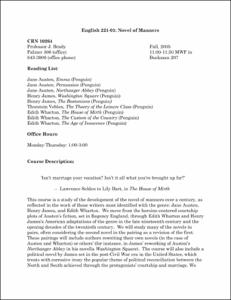Please use this identifier to cite or link to this item:
http://hdl.handle.net/10267/3000Full metadata record
| DC Field | Value | Language |
|---|---|---|
| dc.contributor.author | Brady, Jennifer | - |
| dc.date.accessioned | 2008-12-03T22:30:46Z | - |
| dc.date.available | 2008-12-03T22:30:46Z | - |
| dc.date.issued | 2005-08-27 | - |
| dc.identifier.uri | http://hdl.handle.net/10267/3000 | - |
| dc.description | This syllabus was submitted to the Office of Academic affairs by the course instructor. | en_US |
| dc.description.abstract | This course is a study of the development of the novel of manners over a century, as reflected in the work of those writers most identified with the genre: Jane Austen, Henry James, and Edith Wharton. We move from the heroine-centered courtship plots of Austen’s fiction, set in Regency England, through Edith Wharton and Henry James’s American adaptations of the genre in the late nineteenth century and the opening decades of the twentieth century. We will study many of the novels in pairs, often considering the second novel in the pairing as a revision of the first. These pairings will include authors rewriting their own novels (in the case of Austen and Wharton) or others’ (for instance, in James’ reworking of Austen’s Northanger Abbey in his novella Washington Square). The course will also include a political novel by James set in the post-Civil War era in the United States, which treats with corrosive irony the popular theme of political reconciliation between the North and South achieved through the protagonists’ courtship and marriage. We 2 will also study Veblen’s classic economic study of the leisure class as a relevant gloss on the novels of Edith Wharton set in America’s Gilded Age. We conclude with Wharton’s retrospective look at the courtship rituals of this class in The Age of Innocence, a Pulitzer-prize winning novel written after the cataclysm of World War I. The novels in this course, largely traditional in structure, and spanning comedy, melodrama, satire, and tragedy, focus on the implications of the assumption Lawrence Selden makes in The House of Mirth: that marriage is the heroine’s vocation. This course may be taken for credit toward a minor in women’s studies or as part of a minor or major in English. | en_US |
| dc.language.iso | en_US | en_US |
| dc.publisher | Memphis, Tenn. : Rhodes College | en_US |
| dc.relation.ispartofseries | Syllabi CRN | - |
| dc.relation.ispartofseries | 10264 | - |
| dc.rights | Rhodes College owns the rights to the digital objects in this collection. Objects are made available for educational use only and may not be used for any non-educational or commercial purpose. Approved educational uses include private research and scholarship, teaching, and student projects. For additional information please contact archives@rhodes.edu. Fees may apply. | - |
| dc.subject | English, Department of | en_US |
| dc.subject | Syllabus | en_US |
| dc.subject | Curriculum | en_US |
| dc.subject | Academic departments | en_US |
| dc.subject | Text | en_US |
| dc.subject | 2005 Fall | en_US |
| dc.title | ENGL 221-01, Novel of Manners, Fall 2005 | en_US |
| dc.type | Syllabus | en_US |
| Appears in Collections: | Course Syllabi | |
Files in This Item:
| File | Description | Size | Format | |
|---|---|---|---|---|
| 2005_fall_ENGL_221-01.pdf | 92.81 kB | Adobe PDF |  View/Open |
Items in DSpace are protected by copyright, with all rights reserved, unless otherwise indicated.